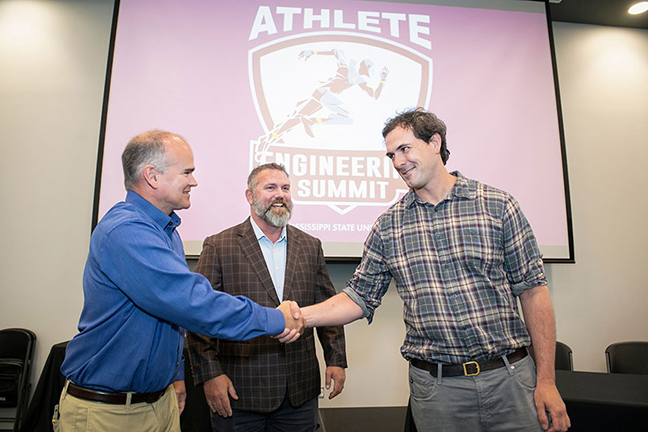MSU, Toyota Mississippi and Liquid Wire Inc. partner on effort to improve industrial safety through wearable technology

Toyota Mississippi Vice President of Administration Erik Skaggs, Liquid Wire Inc. CEO Mark Ronay and MSU Associate Professor of Industrial and Systems Engineering Reuben Burch celebrate a new partnership between the three entities to use wearable technology in Toyota’s Blue Springs plant as part of an effort to improve workplace safety and aid in the prevention of injuries. PHOTO: Megan Bean | Public Affairs
Mississippi State University, Toyota Mississippi and Liquid Wire Inc. are partnering on applied research for the use of smart wearable technology to improve workplace safety and aid in the prevention of injuries.
The collaboration was announced last Thursday [May 11] at the MSU Athlete Engineering Summit, a conference focused on improving human performance for sports, industrial, tactical and at-risk athletes. As part of the project, MSU’s interdisciplinary Athlete Engineering research group will work directly with the Northeast Mississippi auto-manufacturer to implement and assess Liquid Wire wearable technologies inside its facility, providing new insights into ways Toyota can improve job performance and identify potential injury risks.
Reuben Burch, MSU associate professor of Industrial and Systems Engineering and head of the Athlete Engineering research team, said that while wearable technologies have been widely used in collegiate and professional sports settings, their use in industry has been limited. However, there are several potential benefits for companies and employees on the front lines of manufacturing.
“Wearables and other technologies that monitor human performance have tremendous potential to identify injury risks before they become a larger issue,” Burch said. “Industrial athletes have unique, sometimes repetitive movements and this project will help us better understand how the body responds to those tasks. Collaboration is at the core of our Athlete Engineering research, and I am grateful for partners like Toyota and Liquid Wire that are helping us further the societal benefits of these technologies.”
Located in Blue Springs, Toyota Mississippi produces the world’s best-selling vehicle—the Toyota Corolla. With more than 2,400 employees and over 2 million vehicles produced to date, the journey towards a safer road never ends.
“This collaboration is one of the many ways Toyota works to innovate and advance the culture of safety for the manufacturing process,” said Erik Skaggs, Toyota Mississippi vice president of administration. “Leveraging wearable technology to gain data-based insight can help mitigate day-to-day risks while allowing us to predict injury before it occurs. That coupled with Toyota’s core value for continuous improvement will provide safer practices for our employees.”
MSU has partnered previously with Portland, Oregon-based Liquid Wire Inc. on research that uses the company’s wearable soft robotic sensors, which allow for the collection of sophisticated movement data in a more natural or realistic setting than traditional motion capture systems. As part of the project, MSU will conduct validation studies on Liquid Wire’s wearable sleeve and generate training materials for proper use of the technology in an advanced manufacturing setting like Toyota Mississippi’s plant. Mark Ronay, CEO of Liquid Wire Inc., said that preventative ergonomic monitoring is the next frontier in industrial Personal Protective Equipment (PPE).
“We are excited to partner with Toyota and MSU on applying our wearable musculoskeletal monitoring platform to a manufacturing setting,” Ronay said. “Our technology’s ability to directly incorporate comfortable and form fitting sensing circuitry into industrial PPE allows seamless real time feedback on ergonomics, efficiency and health of a movement, allowing preventative protection against injury. We look forward to collaborating with MSU and Toyota to characterize application specific motions specific to their manufacturing environment and develop metrics and custom dashboards for preventing repetitive stress injuries at the workplace.”
The initial project will last approximately one year. In addition to Burch, MSU principal investigators include Lesley Strawderman, International Paper Chair and professor in the Department of Industrial and Systems Engineering, Harish Chander and Zack Gillen, associate professors in MSU’s Department of Kinesiology and David Saucier, research engineer at MSU’s Center for Advanced Vehicular Systems.
MSU Athlete Engineering is a multidisciplinary research group that works to improve human performance in military, rehabilitation, industry and sports settings. With a robust student pipeline, the research group is helping to meet the growing demand for individuals that can collect, analyze, and effectively communicate the meaning of data generated by wearable technologies. For more, see https://www.cavs.msstate.edu/research/athlete_engineering.php.
Mississippi State University is taking care of what matters. Learn more at www.msstate.edu.
James Carskadon | Public Affairs



